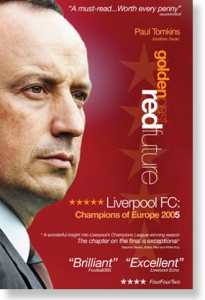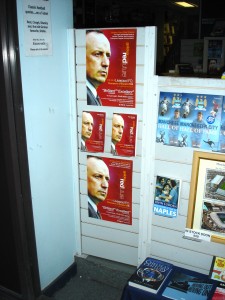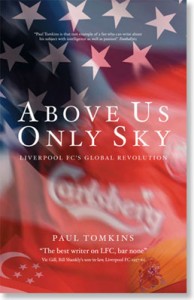I wrote this for an ‘indie’ writers’ website this week. Thought it was worth sharing on here, as a record of my experience writing about Liverpool, and the trials and tribulations of the past decade. I’ll eventually place it into the About section of the site.
I started writing about football in late 2000, as a hobby, after having to give up my job as a designer at The Guardian due to ill health (ME/CFS) earlier in the year.
I’d never had any interest in writing or literature while at school, but had started reading novels in my twenties, and was drawn into the world of words.
I love football, and enjoy writing about it, but fiction has always been my main interest as a writer. However, the chance to counter the Neanderthal musings of the mass media (hoary ex-pros spouting clichés) with what I saw as a bit of intelligence, logic and common sense was too tempting.
For years I wrote for various independent fan sites, building up a small but fairly loyal following. I wrote a lot of articles, but didn’t receive a penny for any of them. However, I honed my craft, and over time, improved in all senses as a writer.
I approached one publisher in early 2005, about the football book I was just completing (about Liverpool FC’s season, written as it unfolded), along with help from Jonathan Swain. I had no reply. Within a few weeks I was in Istanbul, for the Champions League Final, which Liverpool, having beaten the odds to even get there, won in the most dramatic fashion. Fate had provided me the perfect final chapter, and an extra selling point.
I contacted the publisher again, knowing that I was onto a winner. Again, no reply.
(I later discovered that they were working on a similar book, by their in-house author, which came out later in the year; I’d stolen a march, because mine was ready to be released less than a month after the end of that historic match. Upset when I got news of their book later that summer, at first I felt that Mainstream and John Williams had stolen my idea, but soon realised that this was not the case; a book about Istanbul was inevitable for a writer of such standing. I think my anger came from the lack of response from Mainstream, which made it feel like there was more to it than there actually was.)
 So, after a reader contacted me suggesting I use his print company, I published ‘Golden Past, Red Future’ myself. They offered a self-publishing service, and sorted the ISBN numbers, etc.
So, after a reader contacted me suggesting I use his print company, I published ‘Golden Past, Red Future’ myself. They offered a self-publishing service, and sorted the ISBN numbers, etc.
It has to be said that I made a lot of bad commercial decisions along the way, not least with the decision to plump for expensive saddle-stitch binding for what was essentially a paperback book. However, I wanted to provide a quality product, and as a graphic designer, I could obviously make the book look fairly professional.
I was hoping to sell 1,000, and had been told that sports books rarely sell more than 2,000. I set up a website, and expected most sales to be via mail order. Some readers had even agreed to pre-pay for the book, so that I could afford the initial print run.
Before I realised it, the book was listed on Amazon (an automatic occurrence, I soon came to understand), and I was getting a few orders each day from Bertrams and Gardners, the UK’s main wholesalers. I was also in the process of setting up a direct trading account with Amazon, as neither wholesaler wanted to take the book as stock at that stage.
I sent copies to a few publications, and FourFourTwo, the country’s main football magazine, gave the book a one-line review, but a very pleasing four stars.
By this time, the book had made the Amazon top 100, and was the no.1 football book for July 2005. I was soon shipping hundreds each week to Amazon, and all was going wonderfully well.
That was, until they mislaid a delivery of books. All sales stopped dead. They wouldn’t order more until they located them, and they couldn’t sell any, because they didn’t know where they were. At the peak of the book’s success, I was helpless. It dropped down the charts, lower and lower each day, and it took weeks to resolve.
Not only that, but Amazon were taking 60% of the cover price from every sale, and when printing and couriering costs were included, it meant that I was losing money on every copy sold. Still, it was a thrill to have a successful book.
 The next disaster was Sportspages, a chain of sports shops with big stores in London and Manchester. They ordered loads, made a big window display (the only use of all the posters I’d had printed! – another waste of money, although at least it led to this – see photo – appearing in the Manchester store in June 2005), and copies shifted quickly. But payment was dragging on and on. Soon after, I got a letter in the post, explaining that they’d declared bankruptcy. I never saw a penny.
The next disaster was Sportspages, a chain of sports shops with big stores in London and Manchester. They ordered loads, made a big window display (the only use of all the posters I’d had printed! – another waste of money, although at least it led to this – see photo – appearing in the Manchester store in June 2005), and copies shifted quickly. But payment was dragging on and on. Soon after, I got a letter in the post, explaining that they’d declared bankruptcy. I never saw a penny.
But it wasn’t all bad news. Thanks to a reader who worked in Waterstones head office, the title was made ‘core stock’, meaning it would go into all of their major branches. I didn’t know this man; I just got an email telling me he’d read and subsequently recommended it to his superiors, and it was taken up.
But this meant signing up with Gardners, the wholesalers Waterstones put their independent trade through. The terms were 52.5% at the time, meaning that I was now making a small profit on each copy, and only had to send to one place; they would forward on to Waterstones and Amazon, and beyond. I also didn’t have to deal with the independent book stores directly, and get my fingers burned with non-payment or chasing loads of different invoices.
Despite the success of the book, I could get little response from Borders or WHSmiths, and to this day, several releases later, have only made it into a handful of their shops, in small quantities.
On the plus side, I had a brilliant contact at Gardners, who really understood my business, and who gave me loads of advice along the way. Then, the official Liverpool FC website contacted me, offering me a regular column; it would be unpaid, but I’d get to promote the book.
The book went on to sell 15,000 copies, but made me little money. However, it was a start, and I’d enhanced my reputation. Above all else, it had given me an enormous sense of pride and achievement, at a time in my life when I needed a boost. It was never a profit making venture, but it could lead to other things.
The follow up, a year later, brought me back down to earth; despite the success of my debut, I couldn’t generate any advance interest from the trade. It still sold relatively well, but I had to rethink my strategy.
In order to get costs down, I had printed 5,000 copies at the outset, rather than the 1,000 at a time I’d plumped for with its predecessor; and while they eventually sold, it was a much slower process than anticipated.
Still I wasn’t really making any money, and by this time I had given up my Incapacity Benefit. To make matters worse, whenever Liverpool had a bad result, sales would plummet. My health suffered due to the stress, and I ended up selling off the final thousand-or-so copies to the wholesalers at cut price, to draw a line under it and close my business.
Fully rested, and with an obsessive-compulsive inability to leave things alone, after a six month break I gave it another go.
 My next book, ‘Above Us Only Sky’, made the Amazon top 40, but problems behind the scenes at the club meant I decided not to order a reprint when it quickly sold out; I felt I could no longer stand by what I’d written, and it seemed to have quickly dated.
My next book, ‘Above Us Only Sky’, made the Amazon top 40, but problems behind the scenes at the club meant I decided not to order a reprint when it quickly sold out; I felt I could no longer stand by what I’d written, and it seemed to have quickly dated.
But the next book, ‘Dynasty‘ a history of the past 50 years of the club (which therefore gave it a longer shelf life), spent a whole year in the FourFourTwo/Amazon Football Top Ten. It was the third book I’d submitted to the magazine for review, and completed a hat-trick of four-star ratings.
A new problem was that the book had 80 more pages than my previous tomes; which, of course, added to the print bill. An industry insider also advised me not to charge more than £9.99, as this put shops off.
I’d had loads of complaints that the type in my first book was too small – I had to add the chapter on Istanbul, but couldn’t afford to increase the number of pages – so I couldn’t compromise on my new larger font size. Even so, I make a small but satisfactory profit on each copy sold, and it continues to sell. A Danish publisher has recently expressed interest in a translated version.
Following the success of my debut book, I’d had interest from some small UK publishers, but for the royalties on offer, I felt it wasn’t worth giving up creative control; I’d be no better off selling a greater quantity for a smaller return, and I didn’t want to have to dance to anyone else’s tune. Hitting other people’s deadlines is my one fear, given the unpredictable nature of my illness.
By this time, I’d established a lot of contacts – although the excellent account manager at Gardners had left, leaving me to deal with a selection of fairly frustrating replacements – and I’d had worked out how to get my printing costs down without the books looking tacky and falling apart upon opening. I’d bought my own batch of ISBN numbers, and was keeping it small scale but professional. I even published someone else’s book this autumn [From Where I Was Standing by Chris Rowland].
However, for my own latest book, ‘Red Race: A New Bastion‘ I decided to sell it directly via my website only; lower volume, but sold at a higher price. This worked fairly well, but sales were still too heavily affected by results, especially after a bad start to the season. It was driving me insane. Every time the club I supported lost, I was not only left miserable like any other fan, but also hit in the pocket. I was at breaking point.
Producing each book is an exhausting process, not least with designing, typesetting, publishing and marketing them myself, undertaken with a partially-debilitating illness and part-time custody of a young child, on top of the daily chores life throws up. The money I had from my latest book would not last until I could write another, and no regular jobs were open to me, given the unreliable nature of my condition.
So in September I moved in a new direction, and launched a subscription-based website, The Tomkins Times, in the hope that it could break the cycle of having to constantly write and release books just to make a basic living. I had a name, and I thought it was time to trade on it.
The site came about very quickly; I informed my mailing list that I was thinking of quitting, and within a week someone had not only suggested this new route, but built me a great site using WordPress. (The power of the web knows no bounds.) [Thank you, Anu, and all the subscribers!]
A month later, I was invited by Rafa Benítez, the Liverpool manager, to meet him at the club’s training ground and have lunch, in appreciation for the effort and insight on the club’s website since 2005.
It was a unique opportunity; in the previous five years, he’d done no one-to-one press interviews, and although I was not invited there to create a story, I ended up with heaps to write about. In the end, much to my surprise, I spent four hours in his company, and we discussed all manner of issues.
At the time he was under serious pressure, after four defeats in a row, and just days before the vital clash with Manchester United, so all eyes were on him. (The meeting had been scheduled a couple of weeks earlier, before the bad run started.)
Upon my return, and fuelled by an sickness-inducing amount of Red Bull (to go with my own adrenaline overload), I feverishly wrote a 5,000 word piece for my website ready for the next day. Unable to sleep, or switch off my brain, I wrote through the night; every time my head hit the pillow, I thought of something else I didn’t want to forget by the morning.
The article got so many hits it instantly melted the server; a quick technical revamp and the site, which was already a success in my eyes, had loads more hits, and brought in lots of new subscribers.
The day after, given the interest surrounding Benítez, several national newspapers mentioned the meeting, but only one – The Independent – name-checked me, which they did several times in a long and accurately reported piece. Others, however, were quite sneering about it, and it showed how little outsiders can understand about a situation. A few days later, the Sunday Mirror called me simply as a “star-struck blogger”, which I found amusing, given my record as an author.
At long last I feel that I have some stability and something approaching a regular, steady income, although instead of checking the position of my books on Amazon on an hourly basis, I’m fretting if I have a day when I get more cancellations than new subscribers. But on the whole, it’s increasing in numbers, gradually but surely. And even if it doesn’t, I’m already beyond my desire for 500 paying members.
The next aim is to get my novel finished (click link to see holding page on my main website; content will be added to it in 2010) and find a publisher; I don’t feel that I have the knowledge to go it alone, although will happily do so as a last resort.
The one publisher I sent it to, earlier this year, was very positive, and eager to read the rest. But when I pointed out that it wasn’t quite finished, they asked me to resubmit when it is, which is fair enough. I’ve had some incredible feedback on what I’ve written so far. Writing fiction is a very different process for me – much slower, choosing every last word carefully, whereas writing about football is more of a free-flowing outpouring.
And so, despite the ups and downs, I’ve had some great experiences as an ‘independent’ in the last four years. I’m not sure I’d recommend it to everyone, but I certainly would to those with sufficient dedication, and maybe one or two loose screws.